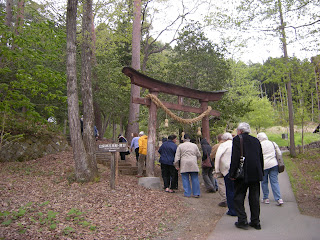I again awoke at an ung-dly hour! I can’t seem to sleep beyond 5:00 am. I chose to have breakfast in the western
style restaurant because I wanted to have fair chance that it would stay down.
After breakfast, we
assembled in the lobby and at 8:00 am walked to the morning market which sells
local produce. There were stores on the
other side of the street and I wandered down the street looking for items that
I wanted to get. I saw nothing that I
wanted to buy although I did enjoy looking.
I headed back to the hotel where I looked at some outfits for my twins,
but decided against buying since I would have been settling. The meeting time for the next trip was 9:30
am. River that runs thru Takayama
Morning Market on the side of the river
Budhist ritual
Entrance to Buddhist Temple
Looking inside Buddhist Temple
Buddhist
Private Garden
We got on the bus and were driven to Mura Folk
Village. Several years ago when a dam was constructed, a few of the buildings
in the area to be flooded were brought to the Mura Folk Village. These buildings date back to the seventeen
hundreds and were interesting in terms of showing what life was like in that
era. We saw one craftsman who makes
shingles working. He is 85 years old and
when he goes, no one will know how to make these shingles. He is storing them up for future use. We saw another craftsman making wooden
ladles. The craftsman who does carving
was not there today much to my disappointment.
There is a shop at
the base of the village and I did find one item which I bought.Mura Folk Village
Water Wheel
View in Folk Village
Description
The six Guardians
85 year old Shingle Maker - the last of this profession
Making Shingles
Heading up steps
Description
Buddhist Temple where performances would occur
House build using triangular construction - similar to 59th Street Bridge
Model
Altar
Altar in Farm House
Buddhist Bell
Cherry Tree
Swan in lake with Carp
We headed to the office/home of the samurai
appointed by the Shogun to rule the area next.
Our guide discussed the importance of class distinction in that
era. Only Samurai could use the Tatami
mats. The rest of the population had to
deal with the wooden floors. Rooms had little to no furniture. Futons were used for sleeping and stored in
cupboards during the day. People sat on
the floor. There were small tables used
for eating, but they were only put out during meal times.
Structure in Akayama
Entrance to "government" building of Shogunate
Entrance
 | ||
| In the Building |
 |
| View of garden from building |
We left the “office” and headed to the Sake
distillery next. I was surprised to
learn the Sake is not much more powerful than wine. Roz and I wandered around a while and then
headed to the restaurant suggested by our guide for lunch. After lunch, I found another item that I was
looking for.
Loading back into the bus, we headed for the “Merchants”
house. Our guide, Hiro, explained the
importance of displaying wealth for a merchant.
If a merchant did not appear successful, people would not trust him. He also demonstrated the proper way for a man
to wear a kimono. A man is supposed to
wear the Obi four inches below the belly button, while a woman wears the Obi
four inches above the belly button.
In Takayama
Merchant's building
Description
Altar in Merchant's house
Altar in Merchant's House
Walking back to the bus
We worked back to the bus and returned to the
hotel. We had a Japanese banquette this
evening. While the meal was not truly
authentic, it did include typical Japanese foods in small quantities so that I
was able to taste and determine what I liked.
I really enjoyed today in Takayama. Takayama has not developed and industrialized
the way Tokyo has and I found it more interesting and different
Dinner
Ros at the Banquette




































No comments:
Post a Comment